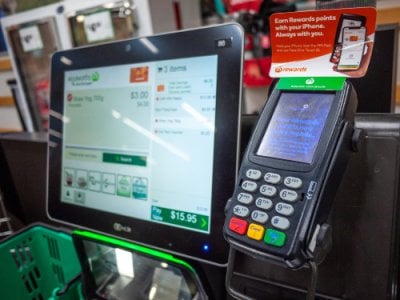Experts expose truth behind Woolworths Rewards program
As we navigate the aisles of our local supermarkets, many of us clutch our loyalty cards with the hope of saving a few dollars on our weekly shop.
The Woolworths Everyday Rewards program is one such scheme that has found its way into the wallets of countless Australians, promising savings and perks with every scan.
But before you swipe your card again, it's time to take a closer look at what you're really signing up for.
Experts are sounding the alarm on points-based systems like Woolworths Everyday Rewards, cautioning that they may be hindering customers from seeking out the best deals.
These loyalty programs are designed to keep shoppers returning to the same stores by offering points for purchases, which can later be redeemed for discounts or other rewards.

While the idea of earning points with every shop sounds appealing, experts said it is essential to understand the potential pitfalls.
The Woolworths Everyday Rewards program allows members to collect points at a variety of participating stores and partners, including Woolworths, Metro, BWS, BIG W, and even energy providers like Origin Energy.
Once you've accumulated 2,000 points, you're faced with a choice: shave $10 off your next shop or convert your points into 1,000 Qantas points. It's a tempting proposition, but is it really worth it?
Finance Editor Gemma Acton highlighted the downsides of such programs on The Morning Show, noting that Australians tend to overspend when enticed by personalised offers.
She said: ‘Seven out of 10 Australians belong to two of the country’s biggest rewards programs—you have to spend roughly $2,000 to get $10 off your grocery shop.’
‘On the one hand, you do get stuff. On the other hand, we do tend to overspend.’
‘If we get sent an email saying, “I think you’d love this special shampoo we picked out for you”, you’re more likely to buy it when you may not have before—it stops you shopping around,’ she explained.
The lure of collecting points can lead shoppers to make purchases they wouldn't have otherwise considered and to shop at places where prices may not be the most competitive.
For example, you might choose Woolworths over ALDI for your milk, simply to earn points, despite the latter potentially offering a better price.
Moreover, Acton emphasised that enrolling in the rewards program means customers are providing personal information.
‘I think most people know when we buy something (shops) collect the information, store it and build a profile on us,’ she explained.
‘But these programs have lots of partners. So, you might think, “It’s fine, I don’t mind if my supermarket knows what I buy in my weekly grocery shop” but they’re giving the information to insurance companies, credit card providers.’
‘The shared data means they can build up an accurate profile of you.’
This concern was echoed by the Australian Competition and Consumer Commission (ACCC), which recently expressed worries in its interim report on the Digital Platform Services Inquiry, particularly regarding the data collection aspect of these programs.
The report suggested that while consumers may enjoy the benefits of discounts and offers, they may also be unwittingly giving away valuable personal information.

Acton also pointed out: ‘The ACCC consumer watchdog told us yesterday the average privacy policy we get these days takes 29 minutes to read, and that’s just reading without stopping to understand it.’
‘They said if you were to read every privacy policy you come across in a month, it would take two full days and two full nights to get through.’
Woolworths, however, stands by its program, stating that if used effectively, it can lead to significant savings.
A spokeswoman stated: ‘Every month, more than one million members enjoy $10 or more off their shop and last year, members who banked their points for Christmas saved on average $100 to spend over the festive period.’
‘We have also launched a subscription service, Everyday Extra, which can save our members up to $100 a month across Woolworths and BIG W.’
‘As well as 10 per cent off their shop once a month at Woolworths and BIG W, Everyday Extra subscribers collect two times points on every transaction, helping them earn rewards points at a faster rate, leading to more savings at the checkout,’ the company spokeswoman added.
On the subject of personalised offers, the company claimed: ‘We find that being able to provide more relevant offers leads to a better experience and additional value back for members shopping across our businesses.’
‘Our suppliers can in turn utilise the aggregated insights we provide to them to consider how they can tailor their contributions to the various promotions that Everyday Rewards offers to its members, to help provide the most value to our members,’ they added.
Recently, Woolworths announced multiple promotions that could benefit their loyal customers:
 We'd love to hear from you, our valued Seniors Discount Club members. Have you found loyalty programs like Woolworths Everyday Rewards beneficial, or do you feel they've influenced your shopping habits in unexpected ways? Share your experiences and tips in the comments below!
We'd love to hear from you, our valued Seniors Discount Club members. Have you found loyalty programs like Woolworths Everyday Rewards beneficial, or do you feel they've influenced your shopping habits in unexpected ways? Share your experiences and tips in the comments below!
The Woolworths Everyday Rewards program is one such scheme that has found its way into the wallets of countless Australians, promising savings and perks with every scan.
But before you swipe your card again, it's time to take a closer look at what you're really signing up for.
Experts are sounding the alarm on points-based systems like Woolworths Everyday Rewards, cautioning that they may be hindering customers from seeking out the best deals.
These loyalty programs are designed to keep shoppers returning to the same stores by offering points for purchases, which can later be redeemed for discounts or other rewards.

Experts warned about the potential pitfall of supermarket reward schemes. Image source: Shutterstock
While the idea of earning points with every shop sounds appealing, experts said it is essential to understand the potential pitfalls.
The Woolworths Everyday Rewards program allows members to collect points at a variety of participating stores and partners, including Woolworths, Metro, BWS, BIG W, and even energy providers like Origin Energy.
Once you've accumulated 2,000 points, you're faced with a choice: shave $10 off your next shop or convert your points into 1,000 Qantas points. It's a tempting proposition, but is it really worth it?
Finance Editor Gemma Acton highlighted the downsides of such programs on The Morning Show, noting that Australians tend to overspend when enticed by personalised offers.
She said: ‘Seven out of 10 Australians belong to two of the country’s biggest rewards programs—you have to spend roughly $2,000 to get $10 off your grocery shop.’
‘On the one hand, you do get stuff. On the other hand, we do tend to overspend.’
‘If we get sent an email saying, “I think you’d love this special shampoo we picked out for you”, you’re more likely to buy it when you may not have before—it stops you shopping around,’ she explained.
The lure of collecting points can lead shoppers to make purchases they wouldn't have otherwise considered and to shop at places where prices may not be the most competitive.
For example, you might choose Woolworths over ALDI for your milk, simply to earn points, despite the latter potentially offering a better price.
Moreover, Acton emphasised that enrolling in the rewards program means customers are providing personal information.
‘I think most people know when we buy something (shops) collect the information, store it and build a profile on us,’ she explained.
‘But these programs have lots of partners. So, you might think, “It’s fine, I don’t mind if my supermarket knows what I buy in my weekly grocery shop” but they’re giving the information to insurance companies, credit card providers.’
‘The shared data means they can build up an accurate profile of you.’
This concern was echoed by the Australian Competition and Consumer Commission (ACCC), which recently expressed worries in its interim report on the Digital Platform Services Inquiry, particularly regarding the data collection aspect of these programs.
The report suggested that while consumers may enjoy the benefits of discounts and offers, they may also be unwittingly giving away valuable personal information.

Acton said that the allure of loyalty points possibly deters shoppers from choosing cheaper grocery options. Image source: Shutterstock
Acton also pointed out: ‘The ACCC consumer watchdog told us yesterday the average privacy policy we get these days takes 29 minutes to read, and that’s just reading without stopping to understand it.’
‘They said if you were to read every privacy policy you come across in a month, it would take two full days and two full nights to get through.’
Woolworths, however, stands by its program, stating that if used effectively, it can lead to significant savings.
A spokeswoman stated: ‘Every month, more than one million members enjoy $10 or more off their shop and last year, members who banked their points for Christmas saved on average $100 to spend over the festive period.’
‘We have also launched a subscription service, Everyday Extra, which can save our members up to $100 a month across Woolworths and BIG W.’
‘As well as 10 per cent off their shop once a month at Woolworths and BIG W, Everyday Extra subscribers collect two times points on every transaction, helping them earn rewards points at a faster rate, leading to more savings at the checkout,’ the company spokeswoman added.
On the subject of personalised offers, the company claimed: ‘We find that being able to provide more relevant offers leads to a better experience and additional value back for members shopping across our businesses.’
‘Our suppliers can in turn utilise the aggregated insights we provide to them to consider how they can tailor their contributions to the various promotions that Everyday Rewards offers to its members, to help provide the most value to our members,’ they added.
Recently, Woolworths announced multiple promotions that could benefit their loyal customers:
- Unlock free vouchers and gifts at Woolworths during their Appreciation Week!
- Win millions of points in Woolworths' daily giveaway!
- Points, perks, and savings galore: Woolworths partners with Accor for major rewards exchange!
Key Takeaways
- Experts warned that loyalty programs like Woolworths Everyday Rewards can deter customers from seeking the best price by encouraging them to shop at specific stores.
- The ACCC has criticised the data collection aspect of such programs, highlighting concerns about privacy and the use of personal information.
- Woolworths claims its rewards program offers significant savings to those who use it effectively, with many customers enjoying discounts on their shopping.
- Finance Editor Gemma Acton cautioned that while rewards programs offer benefits, they also lead to overspending and sharing of personal data with various partners, which can be used to build detailed consumer profiles.







